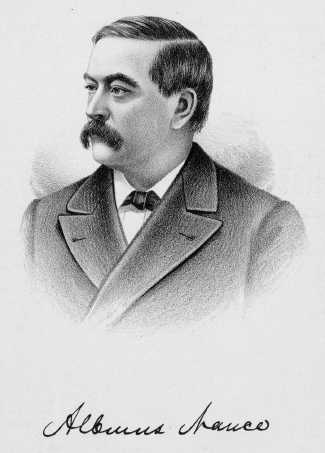124 ALBINUS
NANCE.
ALBINUS
NANCE.
and to defend them if so needed until the death. He
continued in the service until the close of the war,
and participated as an active combatant in the battles
of Guntown, Hurricane Creek, Franklin, Nashville,
Tupelo, Spring Hill and Columbia, Tenn. He was one in
the line that made one of the most daring and gallant
charges at the battle of Nashville, and was slightly
wounded in the same.
The necessity for war being passed,
Cavalryman Nance returned his saber to its sheath, and
when the regiment disbanded returned to his home and
became a student at Knox College, Galesburg, Ill.,
where he took part of the classic course. Soon after
leaving college he commenced the study of law, and in
1870 was admitted to the bar by the Supreme Court of
Illinois, after passing in the best possible manner a
very rigid examination.
Standing upon the threshold of life,
the future stretching before him, animated by the
grandeur of the prospect supplied by hope and
ambition, the subject of our sketch was more
fascinated and impressed by the opportunities and
inducements held out by the newer country, and
pursuant thereto he decided to come to Nebraska, as
the most promising of all the States and Territories
of that magnificent field. This was in 1871. He
secured a homestead in Polk County, devoting part of
his time to farming, but the larger part to the
practice of his chosen profession; but his experience
was such as almost invariably follows--his ability was
speedily recognized and his legal work rapidly grew
upon his hands, and before long he left his farm to
sow and reap in other fields, it once more congenial
and lucrative.
In accordance with the decision
referred to in the above paragraph, Mr. Nance removed
to Osceola, the county seat of Polk County, where
before very long he was fully established in legal
practice. In 1873 his friends submitted his name to
the Republican Convention of the Thirteenth District
for Representative in the State Legislature. The
counties of Adams, Butler, Clay, Fillmore, Hamilton,
Platte, Polk and York sent their delegates, and these
gentlemen thus representing the interests of a large
body of citizens in those counties, comprised the
convention to which his name was presented. There were
seven candidates in all, and each candidate had his
circle of friends; these were diligent in season and
out of season to advance the interests of the several
candidates. Naturally a long and exciting contest was
speedily commenced, and watched with deep interest by
all. In order that the reader may appreciate the
position occupied by the young lawyer in the
estimation of the people, and the impress his
character and ability had already made, we would
notice that after several ballots had been taken the
announcement was made that Albinus Nance received the
nomination, and thus began his political career with a
clear sun and a fair sky.
The principal opponent of our
subject in the convention, urged by his friends, and
spurred on by his own, doubtless, laudable ambition,
determined to enter the field as an independent
candidate, and the most strenuous efforts were made to
defeat the regular candidate of the convention, but
without success. The election showed a majority of
about 2,000 in favor of the subject of this
writing.
In 1876 Mr. Nance was one of the six
delegates chosen by the Republican State Convention to
represent this State at the National Convention at
Cincinnati, and was by his fellows elected Chairman of
the delegation. During that year he was renominated
for the Legislature, indeed, almost without
opposition, and at the opening session of the
Legislative body he was elected Speaker of the House.
If he had made a reputation and record as a member he
more than established it, and added fresh luster in
his more advanced position, thus necessarily bringing
himself before the people, who at once recognized in
him one worthy of additional honors. In 1878 the
Republican State Convention nominated him for
Governor, and he was elected by a large majority. In
1880 he was renominated by acclamation and with wild
enthusiasm, and reelected by a majority greatly in
excess of any other candidate on the State ticket.
One of the happiest steps ever taken
by Gov. Nance was that of his union in matrimony in
1875, when he became the husband of Miss Sarah White,
daughter of Egbert and Mary White, of Farragut, Iowa,
who presented her husband with a bright and beautiful
little daughter, who bears the name of Nellie.

